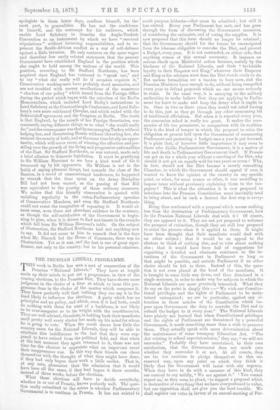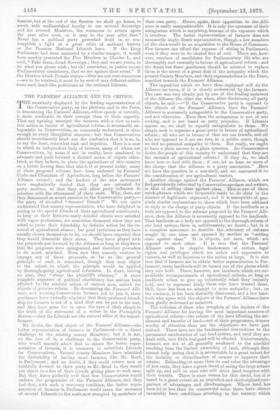THE PRUSSIAN LIBERAL PROGRAMME.
THIS week in Berlin has seen a sort of resurrection of the Prussian "National Liberals." They have at length made up their minds to put out a programme, in View of the coming elections, to the Prussian Diet. They have shown more judgment in the choice of a time at which to issue this pro- gramme than in the choice of the matter which composes it. They know perfectly well that nothing they can say is in the least likely to influence the elections. A party which has no principles and no policy, and which, even if it had both, could do nothing with them for want of a backbone, is not likely to be over-sanguine as to its weight with the constituencies. They are well advised, therefore, in holding back their manifesto until pretty well every elector has made up his mind for whom he is going to vote. When the result shows how little the country cares for the National Liberals, they will be able to attribute this indifference to the fact that they were sup- posed to have retired from the political field, and that when at the last moment they again returned to it, there was not time for the electors to appreciate what an important event their reappearance was. In this way their friends can cheer themselves with the thought of what they might have done, if they had only begun their work a little earlier. That is, at any rate, pleasanter than the admission that it would have been all the same, if they had begun it three months, instead of three weeks, before the elections.
Whatthese elections will have to decide everybody,
whethi er in or out of Prussia, knows perfectly well. The ques- tion really submitted to the voters is whether Parliamentary Government is to continue in Prussia. It has not existed to
much purpose hitherto—that must be admitted ; but still it has existed. Every year Parliament has met, and has gone through the form of discussing the Government measures, of considering the estimates, and of voting the supplies. It is now proposed that this form should no longor be retained ;
that the Government should for the future be emancipated from the irksome obligation to convoke the Diet, and present a Budget, every year. It is not contended, on either side, that anything comes of this annual ceremony. It imposes no serious check upon Ministerial action because, mainly by the kindness of the National Liberals, and their 66 inviolable loyalty to their Emperor and King," whatever their Emperor and King or his advisers want done the Diet stands ready to do. But useless formalities are a burden to busy men, and the Prussian Ministers have enough to do, without being compelled every year to defend proposals which no one means seriously to resist. In the same way, it is annoying to the military authorities to make believe that they are applying to Parlia- ment for leave to make and keep the Army what it ought to be. Once in two or three years they would not mind having to do this, just as they go through any other unmeaning bit of traditional officialism. But when it is repeated every year, the concession asked is really too great. It makes the cere- monies of life too prominent, in comparison with its realities. This is the kind of temper in which the proposal to relax the obligation at present laid upon the Government of summoning Parliament and presenting a budget once a year is put forward. It is plain that, of however little importance it may seem to those who dislike Parliamentary Government, it is a matter of life and death to Parliamentary Government itself. If Prussia can get on for a whole year without a meeting of the Diet, why should it not get on equally well for two years or seven ? Why, in fact, should not the Diet become a merely consulting Chamber, to which the Government should appeal if ever it -wanted to know the opinion of the country on any specific point, or when, for some reason or other, it was unwilling to impose taxes without previously explaining them to the tax- payers ? This is what the alteration it is now proposed to introduce into the Prussian Constitution must inevitably tend to bring about, and in such a descent the first step is every- thing.
Being thus confronted with a proposal which means nothing less than the destruction of Parliamentary Government, how do the Prussian National Liberals deal with it B Of course, they are opposed to it. They are not yet prepared to welcome the prospect of extinction, though they are still less prepared to resist the process when it is applied to them. It might have been thought that their manifesto would deal with no other subject ; that it would be an appeal to the electors to think of nothing else, and to vote about nothing else ; that it would have been full of suggestions for organising a detailed and obstinate resistance to the in- tentions of the Government in Parliament so long as that might be possible, and outside Parliament if no other choice should be left to them. Instead of this, the ques- tion is not even placed at the head of the manifesto. It is brought in some little way down, and then dismissed in a single sentence, in order to make way for subjects in which the National Liberals are more genuinely interested. What they do say on the point is simply this :—" We wish our Constitu- tional privileges and the rights of Parliament to be main- tained unimpaired; we are in particular, against any al- teration in those articles of the Constitution which im- pose upon Government the duty to convoke the Diet and to submit the budget to it every year." The National Liberals have plainly not learned that when Constitutional privileges and the rights of Parliament are threatened by a powerful Government, it needs something more than a wish to preserve them. They actually speak with more determination about the maintenance of some trumpery Education Act. " The Act relating to school superintendence," they say, " we will not surrender." Probably they have ascertained, to their own satisfaction, that the Government does not much care whether they surrender it or not. At all events, they are far too cautious to pledge themselves in this un- reserved way, upon any point on which they think it likely that the Government will insist with any urgency. When they have to do with a measure of this kind, they are content to say mildly, " We are against it." E You cannot expect us,' so they seem to plead, 6 to support a proposal which is destructive of everything that we have ever professed to value, but our opposition shall not give you the least trouble. We shall register our votes in favour of an annual meeting of Par-
liament, but at the end of the Session we shall go home, to await, with undiminished loyalty to our revered Sovereign and his revered Ministers, the summons to return again the year after next, or it may be the year after that." Never has a political party presented itself in so con- temptible a light at a great crisis of national history as the Prussian National Liberals have. If the Long Parliament had been animated by a similar temper, it would have meekly presented the Five Members to Charles I., and said, " Take them, dread Sovereign ; they and we are yours, to do what you please with ; but oh! remember, in justice to our Parliamentary consistency, that we are against their arrest." If the liberties which Prussia enjoys—they are not over-numerous —are to be retained, it must be by men of very different calibre from such lamb-like politicians as the national Liberals.



































 Previous page
Previous page